THE JOURNAL
OF
VAUGHN LORENZO BRIMHALL
December 1985
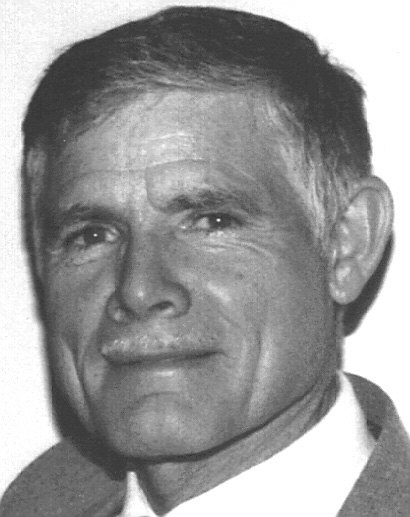
THE JOURNAL
OF
VAUGHN LORENZO BRIMHALL
December 1985

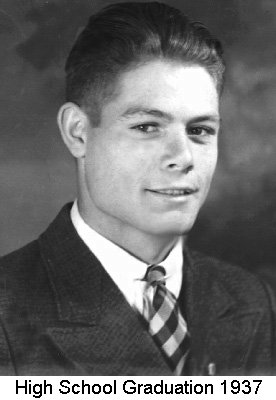
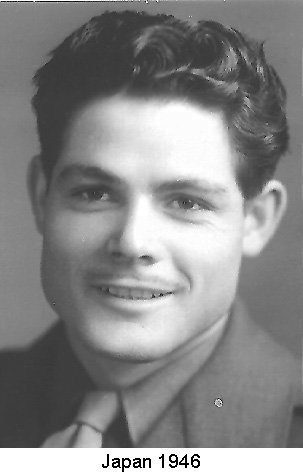
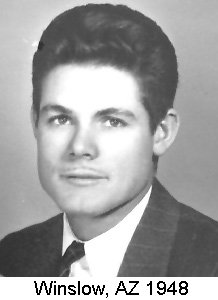
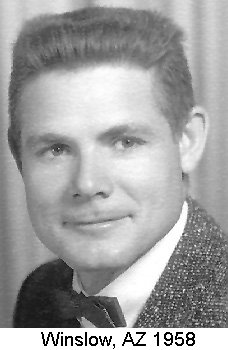
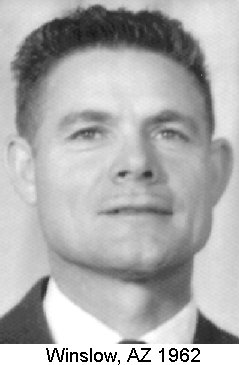
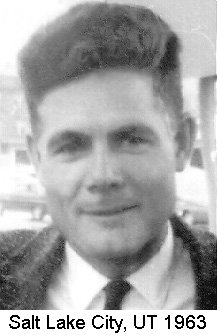
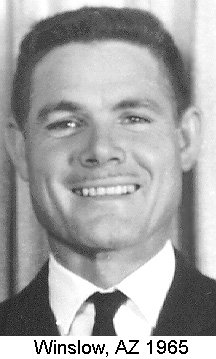
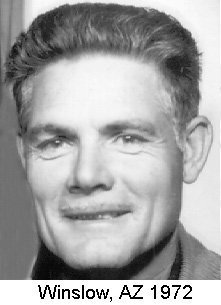
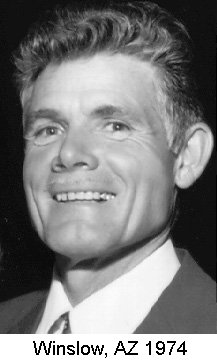
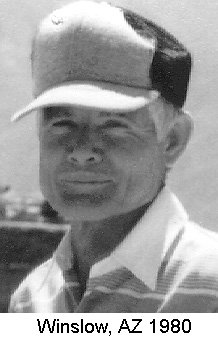
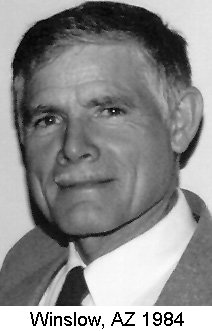
CHAPTER I - THE TAYLOR YEARS
One Of Thirteen Kids
I am the second son of the thirteen children born to Logan and Mary Hatch Brimhall:
Grade School
I attended grade school in Taylor, Arizona, graduating in l933. During my grade school years in Taylor, I had many fine experiences of which I have fond memories. My favorite grade school teacher through the fourteen years I spent in school was a little ole lady by the name of Fanny Payne. She was my sixth grade teacher and I remember that she was very strict and required us to study.
One day she left the room and several of us boys got to playing around. Some of us spit at each other and on the floor. We thought that we were pretty bigshots. When she came back, she noticed this and made us go to the bathroom and get paper towels and wipe it up. Another time when she left the room, we got to throwing erasers. One of the girls, Gertrude Hatch threw an eraser and hit Gus Palmer in the nose and made a big ole gash in it. We never heard the last of this. Some of my grade school teachers were Fanny Payne, Clare Slosser, Lorenzo Rhoton who was also the Principal.
Childhood Memories
Some of the things that I remember most about my childhood in Taylor, Arizona are my Primary days. Uncle Will Willis's hill was always the Hill Cumorah to me because we looked forward to going there to get the gold plates. (WHY)
When I was a Trail Blazer we had bikes, and we made many trips on them in the area. My favorite primary teacher was Sister Ullie Butler.
When I was a Boy Scout, the first overnight trip I ever made was a two- man overnighter for our merit badge. We went up through Shumway and passed by a burned out house. We were pulling our little wagons with our equipment. We saw several traps laying by a burned out house. We figured, "Well, they're no good to anybody," so we picked them up and hauled them home with us. I didn't let my Dad or Mom know that we had these traps. A few days later there was a fellow named Ivan Rhoton who came down to visit Dad. They got to talking about his lost traps. My Dad said, "I think my boys have been doing a little trapping lately. Let's call them in and ask." He ask me about the traps. I told him that I had picked them up, but I didn't think they belonged to anybody because the house was burned out. Needless to say, I learned a lesson there.
My scoutmaster was Harvey Palmer, of whom I will always have fond memories. One weekend we went out to the woods to get three loads of firewood. It was customary for the scouts to haul wood for the widows. We had an old horse by the name of Tex. Dad let me take our team of horses and a wagon. We had to go about seven or eight miles west of Taylor to get the wood. There was about fifteen or twenty of us scouts, and we had three teams of horses and wagons. We camped out overnight there. We made a pact that none of us would go to the bathroom within a certain distance of the camp. That night as we bedded down, ole Tex came right over by our fire and went to the bathroom. Talk about mad! All the guys yelled at me, and I had to get up and clean up the mess.
Some of my close friends during my growing up days were Vincent Lewis, Clair Tenny, Phil Pearce, Jack Standifird, Duffy Palmer and Phil (Boosty) Shumway. Vincent and Clair have passed away. The rest of them are still living.
When I was in the neighborhood of about ten, we had an old tom turkey we called Tom. Every time my Mother would go out to feed him, he would flog her if she got into the pen. He got to be quite mean! Us boys got our heads together and decided that we would fix that old turkey up good. I told my brother, "I'll fix that old turkey up! " I got on my Mother's clothes, opened the gate to the pen, and walked in and here came old Tom. Boy, he went to work on me, and I started hollering, "Tom, Tom, You old fool! It's me, It's me. Don't you recognize me?" as I raised the dress up to show him my shoes and pants. That didn't stop him a bit. I was lucky to get out alive. Sometime later he graced our table -- kind of tough though.
When I was a young lad there wasn't much money to be had to speak of. We worked on the farm for Dad, and every once in a while he would give us a little money so that we could buy candy and the things that we enjoyed. Once in a while, when the eggs got plentiful in the chicken coop, we would barrow three or four and take them over to the old Cash Store and trade them for candy with Sister Larsen.
When I was about twelve years of age, I recall that one morning at breakfast Dad told me to go make him up a dose of salts. I had a liking for salts. There was only enough for one dose, so, I made it up, walked into the archway between the kitchen and dinette, and said to my Dad with a gleam of daring in my eyes, "Watch!" I drank it down in one gulp. Dad chased me. It seems I've heard it said, and it also felt like it, that I had more whippings than all of the rest of the kids put together. When I knew a whipping was due, I'd always gird up my loins and try to outrun Dad. (Foolish boy -- he was a real whiz at foot racing).
My favorite nickname was "Scrumps" or "Snissen". I came by "Snissen" from Otto Palmer who was a cousin of mine. He would come and help us pitch hay. This one time, he was up in the barn pitching the hay back to the back. I was climbing hand over hand up in the rafters. I stopped because I had to blow my nose and was hanging by one had, I hollered at Otto, "Watch out below, I'm going to snot." He said, "What?" I said , Look out, I'm going to snot." He said, "What?" I yelled back, "I'm going to snissen!" and the name stuck with me from then on.
Dad used to have us go outside and kill the flies with a fly swatter. We lived on a farm, and so we had lots of flies. One time Dad made me go out and do this, so I started swatting flies on the windows with a hammer. Needless to say, I got a whipping after breaking two or three panes.
When it was hay mowing time, we would have to sharpen the blades of the mower, and I didn't like to do this. Dad made me do it one day, and so I took a hammer and fixed things up. We sharpened the blades on a large foot-driven circular grindstone that had a dripping bucket of water above it. I beat the grindstone to pieces with a hammer. This was also a big milestone in my life, as my Dad's grindstone never was too good after that.
When we boys were growing up there were four boys to a bedroom. There was Kirk and myself and Vern and Verl. We had a fireplace in the bedroom. In the dead of winter we didn't want to go out to the outside toilet, so we would generally lift the window and wet outside. When we did we always left our telltale marks in the snow. When we did this we would generally get reprimanded by Mom or Dad. Sometimes, when it was too cold to even raise the window, we would wet in the fireplace. The next morning when we built up the fire, it would really smell up the room.
Upon graduation from grade school, I attended Snowflake Union High School for four years. I played freshman basketball and played on the varsity team the last two years at guard position. ln my senior year I went out for football and played enough to receive a letter.
A Teenager In Taylor
When I was about sixteen, I was really due for a whipping. I can't remember whether it was because I'd borrowed gas from the tractor to chase the town in the car, or if it was that I had neglected to tell anyone when I decided to stay all night with a boy friend. Anyway, the result was that Dad took after me with a switch, and as usual I ran. It was a great challenge as I tried to outrun him. My heart pounded with excitement as my bushy, curly, brown hair flew with the breeze. His hot breath was practically on me. His work hardened hands stretching out, just missing a good hold on the short hair at the nap of my neck. I could just feel the smoke rise from my seat if he ever caught up with me. I was just about to give up when my second wind came in, and with the agility of thoroughbred, I upped the distance between us. From the house on the hill to the end of the cottonwoods, and down onto the bottom of the creek road. When I chanced to look over my shoulder, all I could see was the back of Dad's old work shirt as he was going into the barn. If I had known how, I would have turned flip flops, but instead I threw myself down on the moist sand among the stinking bee weed flowers, and to the accompaniment of my thudding heart listened to the buzzing bees and watched the white clouds floating by smiling to myself. Ah! What a day that was! I had finally outrun him!
Incidentally, those bee weeds still produce the best honey in the world.
Also about this time, my Father was building a stone house in Taylor on the east side of Silver Creek. Our stonemason had the house about half way up when he decided he needed to go out of town for a couple of days. About two weeks later my Dad got sick of waiting on him, and said "Vaughn, you're now the stonemason. Get up on that scaffold and start laying stone." I did, and this was my first experience in a long, successful career of masonry work. This house is still standing, and it is still beautiful. Every time I go by it, I have to brag to my wife and kids how I laid the stone on that house. We even made a circle head window. I also remember hauling calilche from down around Woodruff, as we built the house. We used a kiln to dry it out. The house was completely plastered inside with that caliche, and it is still beautiful after almost fifty years.
We went on several trips with Dad. One was when the Mesa Temple was dedicated in l927. We stayed with Grandpa Norman Andrew and Aunt Phoebe Brimhall. It was an amazing thing to me to stand at the side of a real orange tree and actually eat an orange from off it. This was the first time also that I had ever seen a Pomegranate and they sure were good. This was a real golden moment for me. Incidentally, I also attended the fiftieth anniversary of the Mesa Temple and my wife and I are currently Temple Workers in this Temple.
Around 1927 Dad, Henry Fought, Kirk and I headed for the dedication of the Navajo Bridge over the Colorado River. (I never pass it going to General Conference in Salt Lake that I don't think about that trip.). I remember the dusty dirt roads, sand traps, flat tires, Henry driving the car like he was herding a cow, the airplane flying under the bridge, Indian squaw dances, and of there not being too much water to drink, and it was hot! Now, every time I cross this bridge I remember this trip. We always stop at the bridge and drop big, flat rocks to the river below. They make a big bang when they hit the water. As a boy, I remember how huge the river seemed to me at Lee's Ferry and how danged hot the weather was.
In earlier years Dad had taken us to Roosevelt Dam and Coolidge Dam. I appreciate the many sightseeing and historical events that he gave us boys the benefit of viewing and enjoying. Also the few trips we were able to manage to the mountains fishing and camping.
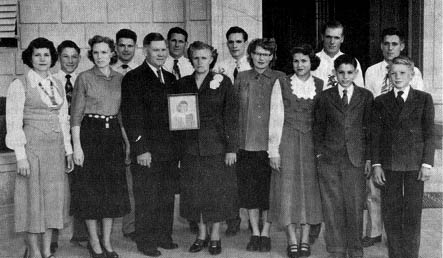
Kirk "L" Brimhall, 25 January l918
Vaughn Lorenzo Brimhall, 3 January l920
Norma Brimhall, 20 December 1921
Vern Hatch Brimhall, 17 October 1923
Verl Willis Brimhall, 17 October 1923
Hulda Lou Brimhall, 29 July 1925
Norman Merrill Brimhall, 12 July l927
Carolyn Brimhall, 23 May 1929
Beverly Jean Brimhall, 18 May 1931
Tezza Maria Brimhall, 1 May l933
Logan Burdal Brimhall, 20 March 1935
Gale "J" Brimhall, 17 August l937
Grant "R" Brimhall, 14 August l937
Sometimes it was practically impossible to get your share of the food if you weren't at the table right at the beginning of the meal.
The High School Years
I graduated from Snowflake Union High School in l937. S.L. Fish was the principal, and Alof Larsen was President of the Board of Education. Our class colors were royal silver and blue. Our class motto was "Ambition Has No Rest," and the class flower was the Larkspur. My favorite teacher in high school was my Father, Logan Brimhall.
About ages fourteen to sixteen, Phil Shumway, Duffy Palmer, and I used to get together every Sunday and have a candy pull after church at one of our houses. I especially remember one Sunday night real well. We decided that we would borrow some chickens from one of our neighbors and have a chicken roast. No sooner said than done, and we had two nice ole fat hens. We headed up to Palmer hill to cook them, out where none of our parents would know about it. After the chicken was all cooked and ready to eat, we started to eat and Duffy Palmer said, "Stop, We've got to have the blessing! He then dutifully pronounced the blessing on our stolen chickens. I kid him to this day about that.
Years later Dad took all of us boys to Hoover Dam before it was completed. The generators were missing. Four years ago I took my girls there, and we saw the generators. The trip was completed over a span of years but nice as always.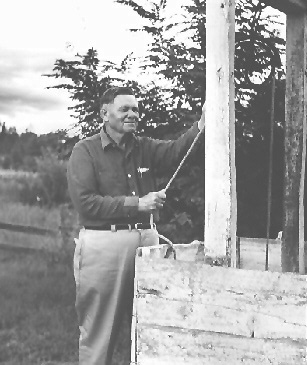
This is my Dad, Logan Brimhall,
at our family Ranch which we call "The B-13 Ranch", the name coming
from us -- the 13 Brimhall kids.
CHAPTER II - OUR FAMILY
Family Tradition
We had several family traditions. Every Christmas Day it seems that we had to rebuild the bridge over Silver Creek in front of our place. The rains would come down and flood the bridges out, and this always seemed our day to pour concrete footings to tie the bridge to.
We always had family home evenings. Every Thanksgiving Day we always went to Grandma Hatch's for a fun Thanksgiving dinner. We had everything you could possibly think of to eat. I remember these occasions real well. All of my uncles, aunts, cousins, etc. were there. In those days the older people ate first and the children after.
Miraculous Experiences
I had several miraculous experiences when I was a young man. We used to cut and haul hay. We had several acres of hay and my chore, lots of times, was to mow the hay. One day I was up in the field mowing the hay. A lighting storm came up. I had just driven the team and the mower over against the fence in under some poplar trees. As I was sitting there under the trees to keep from getting wet, something told me that I should move. Shortly after I had left lightening hit the tree and split it in half.
Another time we were hauling hay. There was Dad, Marion Gibbions, Kirk and myself. Another storm came up. It looked like it was going to be a short one, so we crawled in under the wagon. We were spread out there laying under the wagon to keep from getting wet. Dad said to Kirk, "Move your head out from under the wheel." He had no sooner said this and Kirk had moved his head than lightening hit the tongue of the wagon and the horses started running. One of the wagon wheels rolled over Dad and Marion Gibbions. I was laying in between them so it luckily didn't hurt me. They hobbled around for several weeks after that. We were all knocked out by the lightning and when I came to and saw the rest of them laying there as though dead, I ran for the house crying, "Mama, Mama, Daddy's dead." By the time I reached the house they had come to and were walking around.
One of the biggest and best memories is of how I was always amazed that Dad could provide all that food, and Mom could always have the table laden with good things to eat. Some of my favorites were homemade cheese melted on homemade bread, cold sharp crisp pickles straight from the barrel in the basement, and good old pinto beans. I was her best customer on the beans. Mama worked late into the nights, and especially on Saturday nights she would stay up the longest, to see that our shirts and pants were well pressed and mended for the following Sunday morning. The men folks would leave early in the Morning, and Mom would have to get all the family ready to go by herself. How she ever managed, it will never cease to be a miracle to me. I am so grateful that my memories of her are of such a wonderful Mother and companion to all us thirteen kids at home, and how at ease she made all our friends and any guests feel who came to our home.
Memories of my Mom blend in with the sweet smell of homemade bread and good old beans. I was her best customer for pickles from the barrels in the basement, steak, hot cereal, biscuits for breakfast, homemade cheese melted on toast, and the many gallons of her nice, cool, fresh-churned buttermilk that was waiting for us after working in the hot hay fields all day long.
Mama never learned to drive, so when I got old enough to drive, I was elected to be her chauffeur whether I wanted to be or not. But most of the time I wanted to because I liked to drive the car and get out of work. She was a great visitor and after a while I'd get tired and would honk and honk the horn, but she wouldn't pay any attention. So, I would just drive round and round in a circle in the middle of the big wide streets of Taylor until she finally would have to come out and go home for fear I'd run all of the gas out of the car. My Mother passed away in Gilbert, Arizona -- and was buried in Taylor, Arizona.
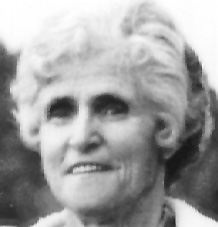 My Mother
Mary Hatch Brimhall
My Mother
Mary Hatch Brimhall
CHAPTER III - COURTSHIP, MARRIAGE AND WAR
The College Years
In 1937 after working all summer in McNary in a molding mill, I came home just long enough to get ready to leave for my first year at college in Thacher, Arizona. I remember Mom standing at the gate watching her second son cross the bridge of Silver Creek and climb the hill to the highway to hitchhike to his destination. I'll always remember she had tears in her eyes. Now, as I send my children away one by one, I know the feelings she must have had. I had a good wholesome childhood, full of fun, work and learning. I'm so grateful for all of it!
In the fall I registered at Gila Jr. College in Thacher, Arizona. I made the football team at 135 pounds, but couldn't make the basketball team. The second year I played football again but this time at 165 pounds. I gained this many pounds in one year from eating so many beans and potatoes while batching with Vincent Lewis, Ralph Gardner, and Bill Flake. Soon after school started the second year, I met a good looking, high stepping majorette from Thacher in her first year of college. We romanced the full year. She helped me clean the music cottage every evening. This is how I worked my way through college. Dad also sent me ten dollars a month to help me get through school. I graduated from Gila Jr. College, which is now Eastern Arizona College, in the spring of l939 and went to work in Morenci, Arizona for the Phelps Dodge Corporation that summer on a survey crew. I kept seeing quite a bit of Hester Elizabeth Damron, the good looking, high stepping, drum majorette. That fall she again registered at Gila where she attended until I talked her into matrimony the 25 of November l939.
In l939 I graduated from Gila Jr. College (now known as Eastern Arizona College). My most memorable teacher there was Harvey Taylor. My destiny was shaped here, as this is, of course, where I met my bride, Hester Elizabeth Damron Brimhall.
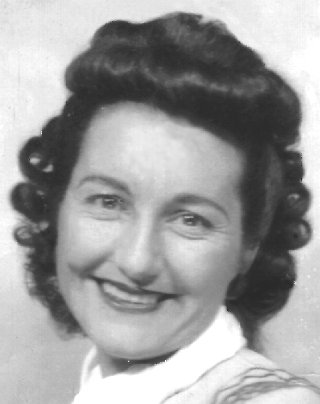 Hester Elizabeth Damron
Hester Elizabeth Damron
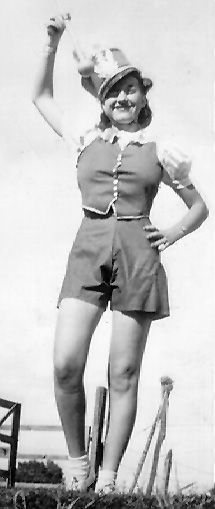 Hester Elizabeth
Damron -- Drum Majorette of Gila Jr. College
Hester Elizabeth
Damron -- Drum Majorette of Gila Jr. College
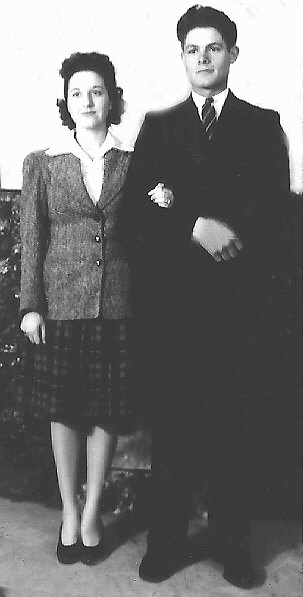
We were married in Tucson, Arizona, November 25, l939 and sealed in the Mesa Temple on October 27, l942.
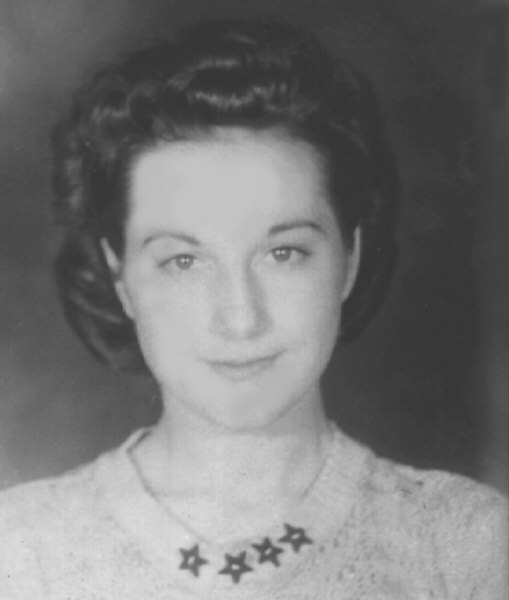
Hester Elizabeth Damron
Another story that happened when I was about nineteen -- Just before I was married was as follows: Hester had come up to visit my folks in Taylor. We had an old work horse by the name of Tex that I already have mentioned. We decided that we would go riding out towards Four Mile. We got on Tex. I rode in the front, and Hester in the middle, and my younger brother Burdal was on behind. We rode out to Four Mile and looked at some of the property
and cattle that Dad had out there. As we started to climb the hill right at the Four Mile Wash, ole Tex started to let out a string of poops. Ole Burdal couldn't control himself and started laughing. It was really embarrassing for Hester and me.
Work and Family
Hester and I were married in Tucson, Arizona at her Uncle George Damrons' home by Bishop Piper. We moved to Clifton, Arizona where we set up housekeeping with the assistance of her Uncle, Harry White, the fire chief, and Aunt Nell.
I was working for Phelps Dodge Copper Mining Company in Morenci, Arizona on a survey crew for 90 dollars a month. Later my salary raised to 200 dollars per month. After Hester and I were married, I got a better job as a mechanic on the trucks for the company.
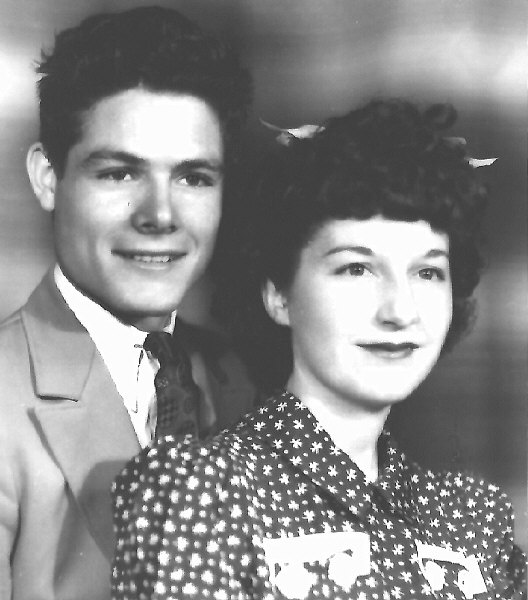
Our wedding picture
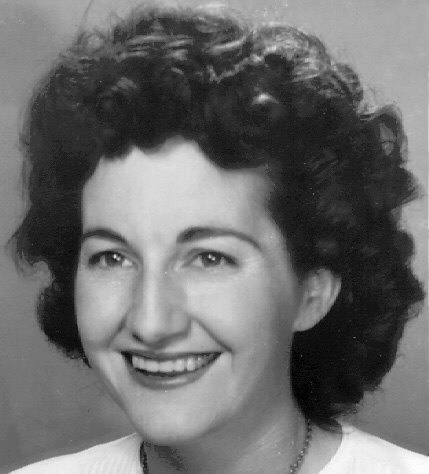
Hester in 1946
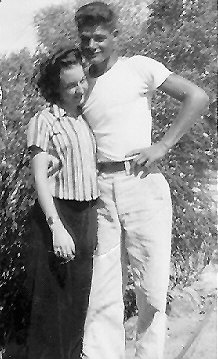
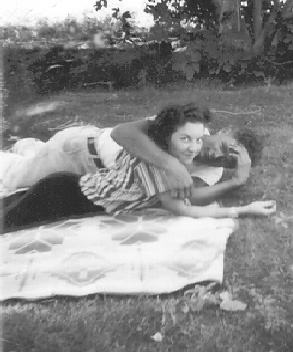
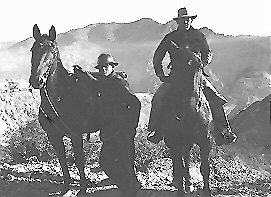
Our first baby, a boy christened Richard Logan Brimhall, was born December the 5th l941 two days before Pearl Harbor was bombed by the Japanese. I brought Hester and the baby home from the new hospital to a new company home in Morenci. I had worked on the fuel oil stove just prior to going to the hospital, and I had left a cardboard box containing my tools on top of the stove. Upon returning with them, as I opened the front door, we were greeted by a houseful of smoke. Hester and the babe had to sit in the car a couple of hours while it aired out.
Dad told me that Uncle Jim Hatch, who was then living in Adamana, Arizona had said that the Santa Fe Railroad was hiring men, so I applied and got a job as a fireman. My oldest child, Ricky was three months old at the time. After moving to Winslow, we were favored with our first girl, Marsha Evonne. When Marsha was eleven months old, I was inducted into the United States Army to serve as an infantryman during World War II. I was summoned from Greenlee County, Arizona November 29, l944 and left from Safford, Arizona, where I had moved Hester and the children a few days before. Here is a picture of us and Mom in front of the house in Taylor by Silver Creek, when we stopped by to tell them
goodbye.
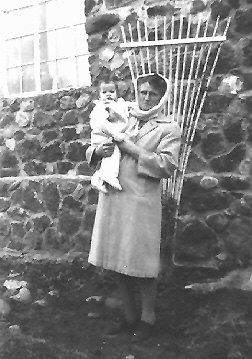
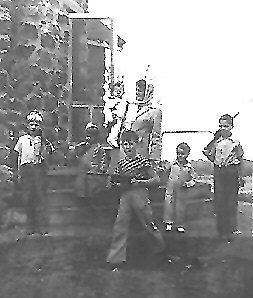
During World War II, before I went into the service, we were living in Winslow where I was railroading. Everything was rationed, especially the gas. We would save our gas stamps for quite awhile, and then we would take a trip up to Taylor to see my folks. One day we were coming back, and between Joseph City and Winslow, Ricky got to crying. The speed limit was forty five, and he was yelling for a drink of water. I was driving about fifty-five or sixty.
All of a sudden, here came a highway patrolman and stopped me. When I told him my sad story he said, "Ah, get on out of here and go on home!" This was Don Welker who lived down the street about three or four blocks from us later on.
A Soldier In World War II
I was called to the service of our country the 29th of November l944. I moved Hester and the children to Thatcher, where they would be close to Hester's mother and reported to Phoenix, Arizona for induction.
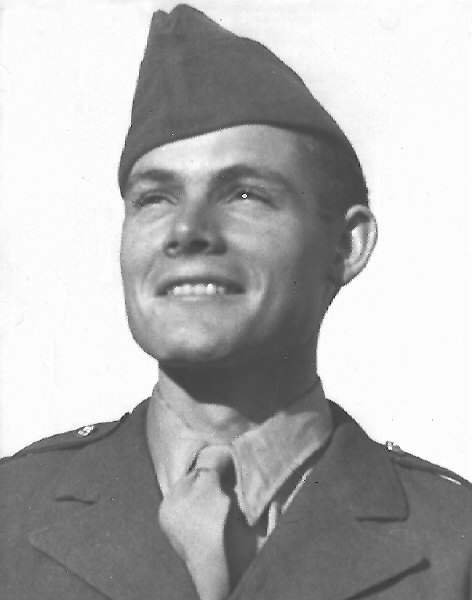
I trained at Camp Roberts, California for sixteen weeks and shipped out from San Francisco after being processed and on alert at Ft. Ord, California. We left by ship and I landed on the Philippine Islands May 17, l945 as a member of an infantry unit. Later I was transferred to a medical corp -- the 43rd Division.
The Family I left behind during World War II
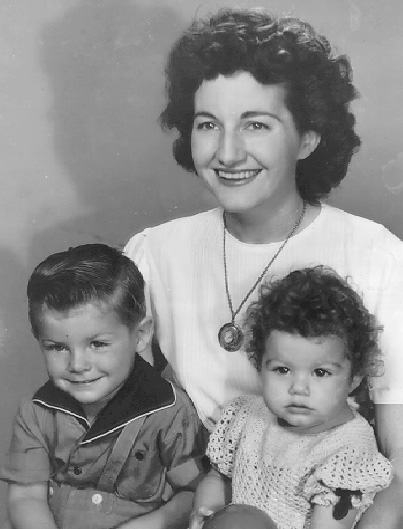
Here are some pictures during that time.
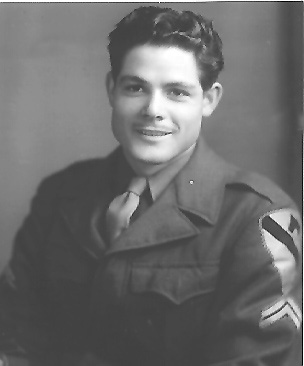
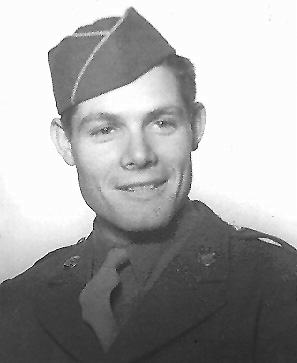
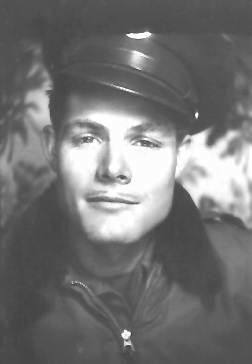
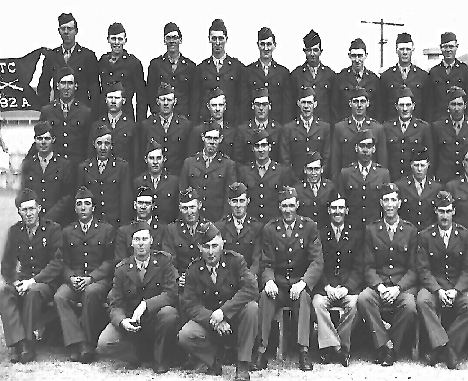
During sixteen weeks of training at Camp Roberts, California, Hester and the children came out and spent the last two weeks of my training living in a motel in Paso Robles near Camp Roberts. We then spent ten days visiting relatives. I reported to Ft. Ord, California for processing and then headed for the South Pacific on the ship U.S.S. General S. Stewart with five-thousand, five-hundred other G. I. s. We stood in line from one meal to the next for our two meals a day. I slept in the middle bunk of four bunks high and could barely turn over.
The first Sunday aboard there was an announcement over the loud speaker that an LDS Service was being held aboard ship in thirty minutes. I attended and was asked to give the opening prayer. There I met J. Morris Richards, a Lieutenant who later became my Bishop in Winslow. In reading his diary, later on as Bishop of the Winslow Ward, he found the entry stating, that I had said the prayer at that particular time. We landed in Manila on the Philippine Islands. From there we went to the Replacement depot and then were sent to the 43rd division some ninety miles north. After the Armistice was signed, the 43rd Division was sent to Japan landing in Yokahama. We were then transported by truck through Tokyo to an airbase fifty miles north of Tokyo. In Tokyo I ran into John Kutch, Boyd Hatch and several other fellows from Arizona who I knew. We went to Church together.
While I was in the service in the Philippine Islands, I was assigned to the 43rd Division. It was an old Massachuttes National Guard Unit that had been activated when the war first started. Most of these fellows had been over there all during the fighting. They of course, had had replacements all along, and I was one of the latest. We spent somewhere in the neighborhood of four months there on the Island before the war was over. They had assigned me to an ambulance division in the medical corps.
I remember the day the captain came in and ask for volunteers to go over on the other side of the Island to work there for awhile in the field hospital bringing wounded soldiers in and out. Our job was to pick up and transport the wounded. One day a Korean fellow who had been shot right around the belly button was brought in. It had happened about twenty-four hours previous. The doctor asked if any of us fellows wanted to watch him operate. About six of us decided that would be quite a sport. We all gathered in the field operating tent to watch the doctor operate. No sooner had he started, than the guys started fainting like flies. I think there were only two of us that lasted through the complete operation. The doctor slit him down the stomach, took his entrails out, cut out the damaged spots from the bullet, and sewed him up. He was given a fifty-fifty chance to live. That night around one or two o'clock, there was terrible scream that woke us up out of a sound sleep. I grabbed my gun that I wasn't supposed to have, but we carried them anyway to protect ourselves, and went running out towards a group of soldiers. There lying on the ground was the Korean fellow who had been operated on. He was dead. He had got up and tried to leave. This is just one of the many things that happened there.
Another time when I was going back to my unit with another fellow, (we always went everywhere in two's) we heard gunfire. All of a sudden, we could see people, Japs, out in the bushes. I gunned the ambulance and away we went. Later we noticed that there were two or three bullet holes in the ambulance, but no one was hurt.
While I was there on the Island of Luzon, my brother Kirk was just over the hill from me about fifteen or twenty miles away at the naval base. When I found out, I asked the captain for permission to go over and visit him. He told me I could take his jeep. A few hours before I was to leave, orders can down that we were to ship out for practice landing operations for the invasion of Japan. The entire base was put on alert, and no one could leave. Just as we were ready to ship out for these landing operations, the Armistice was signed. No sooner was this signed than we were shipped out to Japan where we were sent as an occupation force.
We landed in Yokahama and went through Tokyo. As we drove through Tokyo in the vehicles of the complete 43rd division, our column was several miles long. Coming to Japan by sea, we had occupied six or more ships. As we proceeded through Tokyo and the outlying areas, the civilian Japanese people, mostly old people, children and women, would hide from us. After we passed they would come out to stare at us. You could see hate in their eyes. They hated us, they were scared of us, and they were well-armed with knives, swords, pitch forks, etc. They had made any kind of weapon they could out of their garden implements. You could tell from the look in their eyes, that they had been taught to hate the American people. We too were very apprehensive, even though we had the weapons to control the situation.
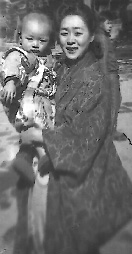
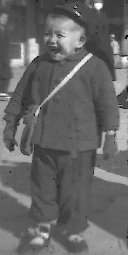
We went north from Yokahama about eighty miles to an airbase there. This is where we lived around the neighborhood of about a month. Then the 43rd Division was shipped home practically intact. Just us young fellows, who had recently come to the division, were the only ones who couldn't go home. This was because we didn't have the ninety points that were required to return to the States at that time. Most of the division had been over there in battle for three or four years. Our point system was the only way we had to get home. We were sad to see our buddies leave and us have to stay there. When they shipped out, they put us younger fellows, the ones who hadn't been there so long, in the American Division. We stayed with the American Division, which was located about forty miles north of Tokyo, for about one month. The American Division was then shipped home and those of us without enough points were sent to the 1st Cavalry Division located about ten miles east of Tokyo. This was located not too far from the beautiful volcano, Mount Fujiama. Most of the pictures I have were taken from this point forward, as I did not have a camera until I joined the 1st Cavalry Division. I bought this camera in Tokyo.
I landed back in America on April 4, l945 at Ft. Lewis, Washington after being on the water for twelve days and in one of the worst tidal waves to this date. Only around three-thousand men were on this ship. Going over five-thousand, five-hundred men had been on the ship.
I received the World War II Victory Medal, The Good Conduct Medal with the Bronze Star, and the Philippines Liberation Ribbon with a Bronze Star. I was sent to the States and mustered out of the Army at Camp Beal, California the eighth of April l946.
We went to Thacher to pick up our two children and visited Hester's Mother and Ray, then on to Taylor to visit my parents. We then returned to Winslow to work on the railroad. Soon after our return to Winslow, we built a home and moved into it. We had a G.I. Loan of four-thousand dollars against it. Brother Vick Overson, who was the contractor remodeling the Church at the time, signed all necessary papers and, we did the work.
We then continued our family adding three more girls --
Brenda Dee Brimhall, June 6, 1947; Sylvia Ann Brimhall , November 21, 1950; and
Amber Brimhall, Feburary 7, 1953.
Our Family in 1964
Pictures of War
The result was that we had lots of spare time, and so we formed a football league for all of the Japanese Islands, Formosa, and the surrounding area. This team was one of the top teams. There were about eleven teams who had come through the division championships. We then went to Osaka to decide who was the best team of all of this area. This was the team that beat us and went on to lose the championship game. I don't remember where they were from. We didn't have football equipment and uniforms, so we had to play a nine-man touch football that became real rough. There were teams there from all over the South Pacific.
Boyd Hatch
This is a Jap steam engine in a train yard near Tokyo.
Five Japanese men who worked around our barracks as janitors. They were all real good and cheerful men. We got along real well with them. They spoke enough English that we could communicate.
Some of the few remaining buildings after the atomic bomb was
dropped.
Baptism
I was baptized the twenty ninth of February l928 instead of on my birthday January third l928. the reason for this was that it was so cold that the ice was so thick that they couldn't break it. In February they were finally able to cut through the ice, which was about eight inches thick, and then and there I was Baptized. This took place in Silver Creek which was a little creek that ran in front of our place. I was then confirmed March the Fourth l928 by Samuel F. Smith.
Callings In The Priesthood
I was ordained a deacon January 3, l932 by L. D. Rhoton Jr. I was ordained a priest March 7, l937 by my father Logan Brimhall. In November of l952 I was called on a Stake Mission and was released on November 28, l954. I then served as second counselor and then as first counselor for more than eight years to Bishop Harry Hancock of the Winslow Ward. I was ordained a High Priest and set apart to this position on September 22, l962 by Joseph Fielding Smith in Snowflake.
PART OF HESTER AND VON'S LIFE STORY 2/97: By Hester Brimhall
I met my husband when I was eighteen years old while living at home in Thatcher. I was first attracted to him because he was from another town, good looking, bashful, built well and went to church. He was a good singer, dancer and boxer. The first date we ever had was when I was in a play at the college, and he was too and we walked home together. He said he was attracted to me because I was a high stepping Drum Majorette in High School and College. During this time my cousin, Irene, was living with us and attending college with me. We were dating these neat guys from Taylor. I was going with Von and she was going with Vincent Lewis. Every time they were supposed to come to pick us up they were always late. We could never get them to tell us why until one day we coaxed and so they said they'd get their white shirts on (and they had to wash and iron them) and get doodeed up and then when they would come to the big ditch one of them would challenge the other to try to jump it. It was actually a rather wide canal that ran through that valley. About l8 feet across and no matter how they tried they always fell in and had to go back home and change clothes. They never did make it but kept trying.
Like all members of his generation, Keith Little remembers exactly where he was when he heard the news of Pearl Harbor. A Navajo, he was attending school in Ganado, Ariz., on the reservation. "Me and a bunch of guys were out hunting rabbits with a .22," he recalls. "Somebody went to the dorm, came back and said, "Pearl Harbor was bombed." One of the boys asked, "Where's Pearl Harbor?"
They hate Americans. They want to kill all Americans."
One of the most dreaded Japanese word during this war was "Kamikaze" meaning Divine Wind. These Japanese planes were converted bombers to single seaters-room only for the pilot who was strapped in Permantly. They were packed with heavy bombs, and the nose of the plane was fitted with a long detonator fuse that exploded on contact. The Americans called them suicide planes, because even if they were on fire from a direct hit they would fly their plane into any American target 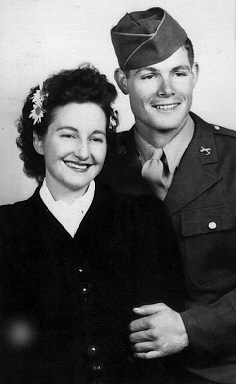 I met my darling in Mesa for a couple of days of reacquaintance.
I met my darling in Mesa for a couple of days of reacquaintance.
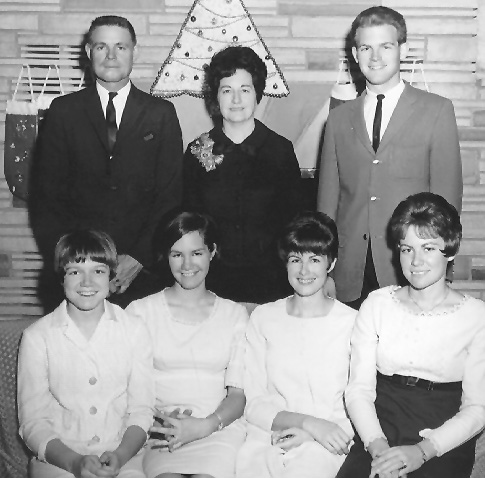
I would like to mention a little bit about these pictures.
This picture is set against our barracks.
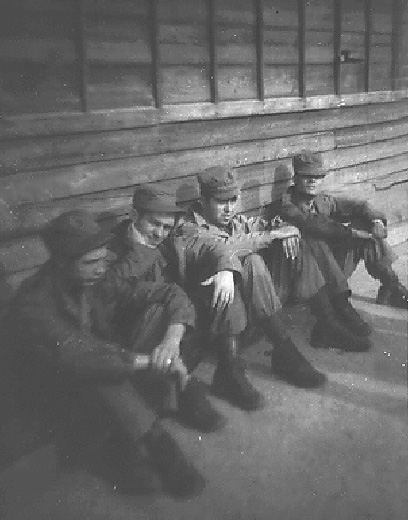
This is of me and three of the main goof-offs who were in my squad during basic training at Camp Roberts, California prior to going overseas.
Incidentally, I was a squad leader. There were four squads in our platoon and I was the leader of the third squad. These three guys were the goof-offs of our squad.
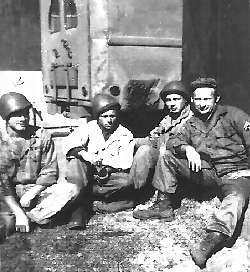
This is a team of fellows whom we played in football in Osaka, Japan in l945. While we were in Japan, all we had to do was to police, keep things up, and see that the Japanese people stayed as they had promised.
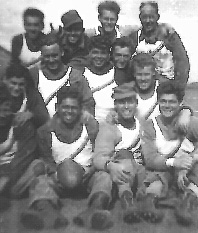
Me with some of my buddies. I am in the middle of the front
row. This was taken in front of a government building.
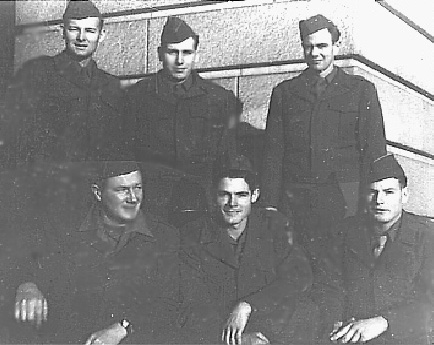
.jpg)
This is our first sergeant. I was the sergeant in charge of the recreation in our company in the 1st Cavalry and the men who made up our touch football team. We won the Championship for our unit. This was taken in Osaka, Japan.
This is a friend of mine from Taylor, Boyd Hatch, who was an M.P. in a unit there in Tokyo itself. I ran into him and John Kutch, a friend of mine and fellow railroader from Winslow prior to his going into the navy. I had been on Japan several weeks before I was given a leave to go into Tokyo. The first time I went into Tokyo was on a Sunday. I was walking down the street with one of my buddies feeling that I knew no one in the country, when all of a sudden I heard, "Hey Vaughn!" I looked around and couldn't see anybody and thought, "Boy, I'm going crazy. I must be hearing things." I turned around and started walking, and again came, "Hey, Vaughn!" I turned around, looked again, and here came John Kutch strolling across the street. We had a good ole visit. It was the first time that I had seen him in about two and a half years. He asked me what I was doing. I told him that this was my first visit in Tokyo, and that we were off to see the sights. I asked him, "Where are you going? Why don't you come with us?" He said, "Well, I'm going to a zone conference. They're having an LDS Zone Conference. This will be the first since the end of the war." I replied that I had no idea that there was a Mormon Church here. John said that he hadn't known it either, but that they had announced it on their ship, just before they had docked day before yesterday. So, I went with John to this Zone conference. If I remember right, there was a General Authority from Salt Lake. I think that Boyd K. Packer was one of the servicemen there who spoke in the service. There were also approximately eleven Japanese members of the Church who attended this meeting. They were all that was left of the Japanese members of the Church who had not been scattered or killed. Now, returning to Boyd Hatch, it was a short time after this that I also met Boyd Hatch, the M.P., on the streets of Tokyo, as I had met John Kutch. I had no idea that Boyd was there either.
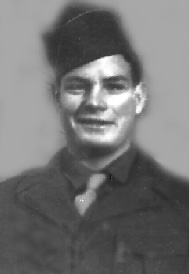
These are some of the members of my football team before my departure from Tokyo on our way to Osaka.
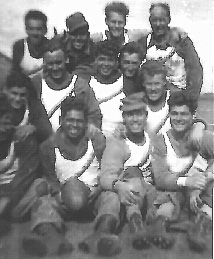
This is me in my fatigues with a towel on my way to take a shower at the
latrine.
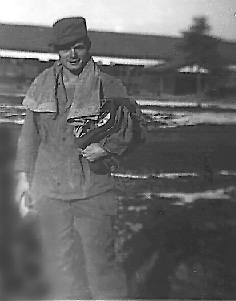
We lived at an old Japanese army base there. Our latrine was a covered building with concrete floors that had troughs in it that the water ran through all the time. These troughs were about four feet apart. You would just squat down, do your job and be off to take a shower or do whatever else you wanted to do. It was quite a system. The waste would run off into holding tanks where the Japanese would bring their "Honey Wagons," and dip this out of the cisterns. They would then use this to water their gardens and farms by dipping it out of the barrels on the wagons.
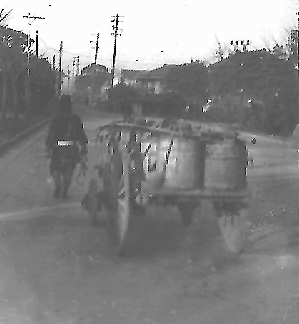
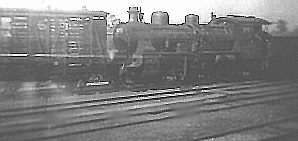
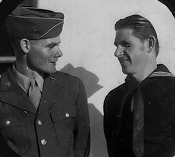
This is my brother Kirk and me somewhere here in the States. This was just after I had come home from overseas.
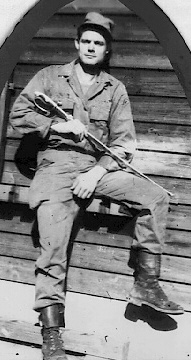
These two pictures are of me and my sabers that I acquired in Japan. I am sitting by our barracks in the 1st Cavalry Division.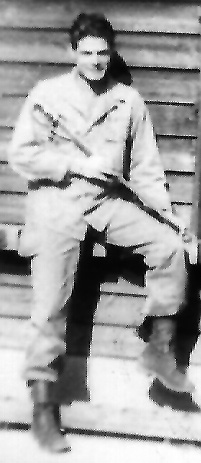
This is me and my helper while on duty in Japan. This is our ambulance, which was similar to the one I drove while I was on Luzon in the Philippine Islands with the 43rd Division.
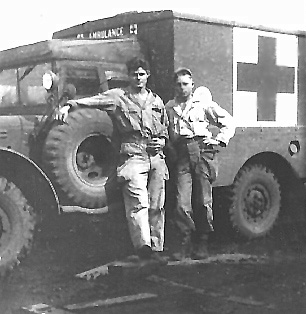
.jpg)
Picture of me, one of the Jap rickshaws, and my Buddy on the streets of Tokyo.
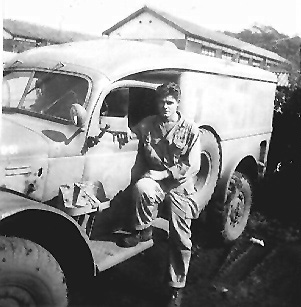
This is what my "mechanized horse calvary" unit was made of.
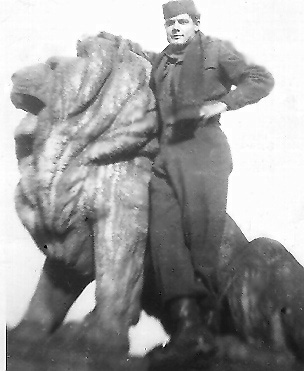
Picture of me and a lion in front of the Japanese Imperial Palace.
These people are of two of Japan's famous movie stars who made the statement, "Ononeo san waha conowaya," which means "never happened." This was a famous phrase and byword in Japan at the time just prior to our coming there.
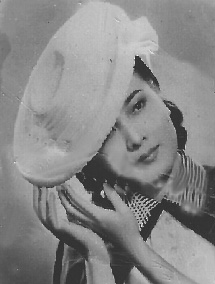
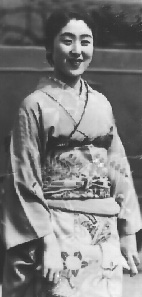
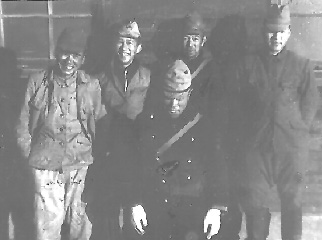
The beaufort (Jap shoeshine boys). They turned the tables on two G. I.s as you see here.
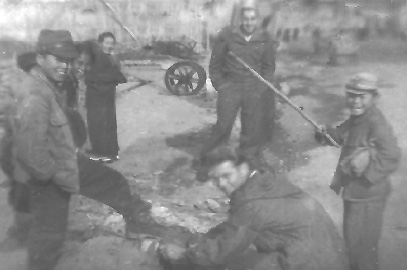
Pictures of the ship that we came home from Japan on at the time we were ready to leave.
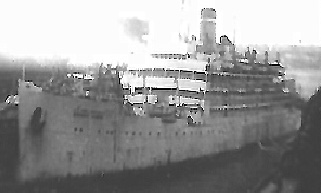
These pictures show the devastation in Olaka, Japan, the results of which we witnessed. It was so devastating! People couldn't even begin to understand or even imagine the damage that could be done by the atomic bomb, unless they could have seen it as I did. It was simply terrible! But, in another way, I would say that it was for the best. If they had not dropped the bomb, many more Americans would have been killed, as well as many more Japanese. I actually think that it was the best for everybody concerned.
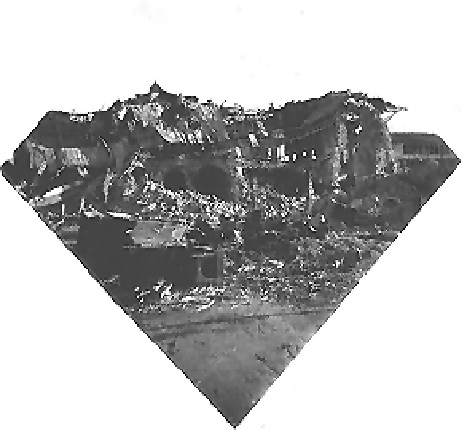
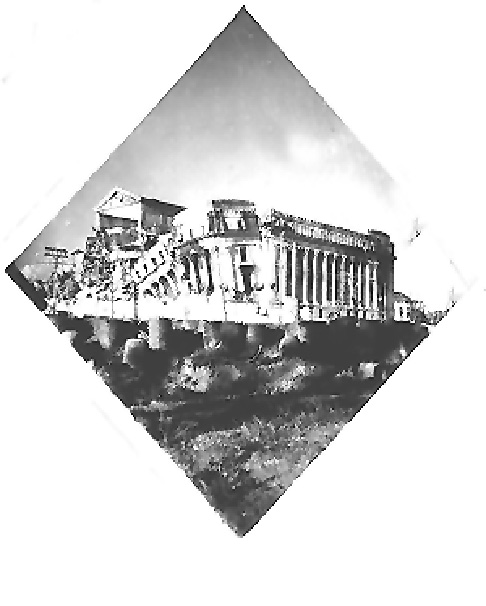
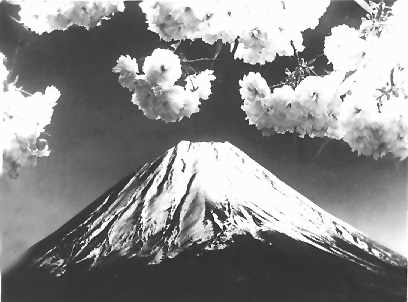
Mount Fuji near where the 1st Cavalry was stationed.
Chapter VI - The Church Years
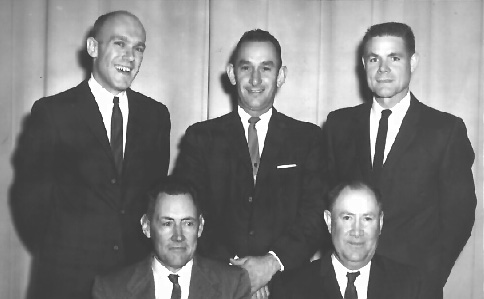
Hunting and fishing stories -- Shooting a hole in the truck, Painting our faces with the Chamimas, Shooting
squirrels, Shooting turkeys, Shooting three deer,
Family Activities -- Trips to San Diego, the Ranch, Mesa in Jan, Little Painted Desert, Grand Falls, Snow Bowl, Cutting Wood, Lake Powel, The Motor Home, The Boat,
Homes Built for Family -- Logans, Cinder home, Grandma Damrons, Mahoney, 1st on Gilmore, 2nd on Gilmore, 4 rentals
Dad's Friends -- Oliver Hardy, Clyde Rhoton, Harry Hancock, Arlo Lee, Johnny Kutch, Bendrew Rhoton,
The B-13 Ranch
Unique Vocabulary -- Get your head cut in, Put on the dog, Laripen and scrumptious, Hubba-bubba, Get the lead out,
Burrial Location and Inscription -- Taylor, AZ Cemetary plot # ___, "The Peacemaker", Dates, Photo, Father and Grandfather, Gary Feezor,
Missionary Service -- Two indian stake missions, Marc Samuel Brimhall, people financially sponsored on missions,
Working with Dad -- Moving piles of bricks, Walk off job, perfection redid garage we stuccoed, well know go his excellent work, injuries on the job, Harry Hancock's nose, 1 man who did'nt pay,
The Mustach -- Mom liked, red and used masquera, shaved when President Kimball called him to the temple, pencil type,
History of Health -- track, boxing, football, muscular right side from plastering, chicken legs, 1st heart attack, 2nd heart attack, prostate,
The Railroad -- The Mormon Bishop, Bull Ring Mitchell drunk, Railroad Bull working for Pres. Smith, Faithfulness to attend meeting no matter what time he go in, forced retirement at 29 years, men who died in accidents, wrecks, rails at his viewing-car toads,
Building a Masonry Business -- Started with, Oliver, large commercial buildings, grout pumping, block fences, fireplaces, slump block, stove pads, stem walls, Hosteen, size of crew, Reservation work,
Helping Others -- Pat Richey and trailer, children, The plate is broken, Ricky's management while in Chile, Building the old church, Building fund assessment and beyond, Bonnie and Merrill,
Irene started dating Marvin Owen from Safford and they soon married but I kept dating Von and we were married November 25, 1939 in Pima County, Tucson, Arizona by LeRoy B. Pipper, ( President of the Tucson L.D.S. Branch.) Our marriage was recorded the 6th of December 1939 at 2:30 p.m. in book 17, page 99 of the marriage records in Pima County, Tucson, Arizona at the request of my Uncle George A. Damron. The witnesses to the marriage were my cousin Irene Damron Owens and her husband James Marvin Owens. We were endowed in the Mesa, Arizona Temple on the 27th of October 1942 by Charles V. Pugh. The witnesses were W. B. Maxwell and George A Martineau.
Our goals and plans for the future were to get along together, have a family and bring them up in the gospel, have them develop their talent, get married in the Temple and go to college.
We spent the night at my Uncle George's home and then went to Clifton, Arizona the next day. Here we rented a house as Von was working for Phelps Dodge, a copper mining company. We moved five time the
1st year we were married. We finally moved to Morenci in an area named Stargo to be nearer his work and then 3 months later we moved to Winslow, Arizona.
I grew to admire my husband and my tribute to him is that he never gave up. He had a good outlook on life. He handled his role in life as a husband, father and grandfather with excellence. He had a true trust in
God and always was faithful to family and church. He was a very clean person and bathed often and smelled good and looked nice. He had much endurance. He held admirable goals for each of our children and when we felt we had found a talent in each one he held down two jobs so they could develop their musical talents. He was friendly and remembered people and their names and they liked him. He was always patriotic to his country and served with honor in World War II. This terrible war became a part of our life and time.
In September of 1940, President Franklin D. Roosevelt announced he had traded fifty aging destroyers for lend leases on bases in British territory in the New World. Roosevelt called the deal "a far reaching act of preparation for continental defense in the face of grave danger." These eight lease bases were British Guiana, Bermuda,
Newfoundland, the Bahamas, Jamaica, St Lucia, Trinidad and Antigua.
THE DRAFT
Further more, guided by the President, Congress passed the first peacetime draft law in American history. Enacted in Sept., l940, it registered 16, 400,000 men in Oct. Those of our family that were caught up in this draft was Von, a dog face in the United States Infantry, his brothers Kirk, Vern and Merrill in the Navy, my brothers, Chet, who went in one of the first unites of the National Guard and served all the war years as an Infantry man in the South Pacific, Jack as a tail gunner in a B-34 bomber in Europe. my sister Armelda's husband , Wayne Doc Savage, cook in the Navy, and my cousin Irene's husband, Marvin, was in the Navy Postal Service, in San Diego, California.
Britain was threatened by invasion from Nazi Germany. Their prime minister, Winston Churchill, had heroically rallied his people and said to them. "I have nothing to offer (you) but blood, toil, tears, and
sweat. "This statement rallied not only his own people but others who nations who were involved.
TOKYO'S TRICKERY.
While the United States was making efforts to help halt the Nazis, the Japanese were also laying plans. Ambitious Japanese military leaders believed that they could conquer any part of the eastern Asia. The U S saw it as a bad sign when in Oct. a general, Hideki Tojo, became prime minister of Japan. We know that the Japanese had already made up their minds. They planned to attack the American naval base at Pearl Harbor, Hawaii, on Dec. 7, l941. Our son Ricky was born two days before this and I remember the doctor and Von coming in to tell me this news as I lay in a hospital be in Morenci.
PEARL HARBOR AND AFTER
Sunday, Dec. 7, l941, began as a beautiful day at the United States naval base of Pearl Harbor, where American ships were riding at anchor. But at 7:55 A.M. a fleet of Japanese dive-bombers appeared in the sky and began their carefully planned attack. Less than two hours later it was completed. Five battleships had been sunk and three others had been badly damaged. A number of smaller vessels also had been either sunk or badly hit. I had a cousin, Tom White , who was there and survived.
For America the disaster meant deep sorrow and fierce anger. More than twenty four hundred navy people had been killed and more than eleven hundred wounded. In this sneak attack the fleet had suffered the worst defeat in American history.
TO ABSOLUTE VICTORY
The following day Pres. Roosevelt went before Congress and asked it to recognize that from the moment of the attack the United States and Japan had been at war. His voice was calm as he declared. "Always will our whole nation remember the character of the
onslaught against us. No matter how long it may take--the American people in their righteous might will win through to absolute victory." With only one nay, Congress passed the declaration the Pres. had requested. The people quickly recognized what they faced as Germany and Italy declared war on the United States.
American military chiefs saw that they must focus on destroying the European Axis first. Never- the -less the nation could not be idle in the Pacific, where they suffered terrible defeats. Lacking the air and sea support they needed, American and Filipino troops in the Philippines were forced to surrender to the Japanese on May 8, l942. Finally the tides of war turned and the battles of the Coral Sea and Midway stopped Japan's advance in Pacific waters.
In the meantime the end of Nazi Germany V-E Day (or Victory-in
Europe ) was May 8, l945. On that day Germany surrendered all of its armed forces unconditionally. In the streets of cities in Europe and America, millions of people cheered the news that "it" was at last "Over" in Europe.
I remember V-Day. Everyone got in their cars and rode up and down the streets yelling and screaming and honking their horns, and holding the V
Day index and middle finger sign up. The kids and I sat on our car out in front of our house and watched everyone with thankfulness in our hearts.
The victory in Germany resulted in the uncovering of some of the most shameful deeds in all human history. The Allied soldiers found prison camps--called Concentration Camps--where starving Jewish men, women, and children had been penned up. The Nazis had operated gas chambers where Jews and other Nazis opponents had been heartlessly put to death. In a brutal drive against the Jews, not only in Germany but in the conquered countries as well, Hitler and his men had wiped out an estimated Six Million human beings.
In the summer of l942, the United States Navy and some marine units had opened a campaign against Japan in the Solomon Islands. The fighting was fierce, and not until the late winter was Guadacanal taken--after a terrible battle. Island by island was the pattern from then on. The Marshalls then the Marianas, the Carolina Islands and then the Philippines. The battle of Leyte Gulf was the greatest naval engagement in history. While the U.S. Marines toughest battle in marine history took place at Iwo Jima and Okinawa which was the costliest victory of the war.
As the European and the Pacific wars were reaching their final stages in April, President Franklin Roosevelt died suddenly of a stroke in Warm Springs, Georgia. Less than four months earlier he had begun his fourth term as President. Though he was mourned the world over by all free men; English people grieved especially. Churchill later wrote that on receiving the news, he sat speechless for a full five minutes. Harry S. Truman, of Missouri, the Vice-President, now the President, announced that the country's war policies would be continued. Germany surrendered less than a month later.
LAST WARNING
In July Truman traveled to Germany, and there he and the other leaders of the war against the Axis laid final plans to overcome Japan. A result of the conference was a last warning to Japan to surrender or face "utter and prompt destruction." The Japanese government chose to ignore
this warning.
THE FIRE OF A THOUSAND SUNS.
In close secrecy a group of scientists in America were at work trying to create an atomic bomb. After spending over two billion dollars and several years in preparation, they were ready at last to test it on July 16, l945.
The new bomb was exploded at Alamogordo, New Mexico, as hundreds of scientists watched at a safe distance. As the giant explosion sent up a mushroom-shaped cloud and gave off the light of a thousand suns, they realized that a new era in history had suddenly opened. Truman learned of the successful explosion while he was in Germany. He ordered the use of the new weapon against Japan. On Aug. 6, 1945 a B-29 Super-fortress plane carrying an atomic bomb took off from Tinian Island in the Marianas. Reaching the city of Hiroshima in Japan, at 8:00 A. M. it dropped it's deadly burden. The bomb exploded with a force of 20,000 tons of TNT, the most powerful explosive previously known.
The destruction was enormous; over 80 percent of the buildings were destroyed, and most of the remaining ones were badly damaged. But worst of all, between seventy and eight thousand people were killed and as many more wounded.
V-J DAY
When similar destruction was rained on the city of Nagasaki three days later, the Japanese decided to surrender. The end of the war in the Pacific came formally on Sept. 2, l945 in Tokyo Bay. There General MacArthur took charge of the proceedings aboard the battleship Missouri (chosen in honor of the President)
As Americans rejoiced that on land, on sea, and in the air the Allies were victorious everywhere in the world, President Truman spoke to the nation over the radio. He
said: "It was the spirit of liberty which gave us our armed strength and which made our men
invincible (unconquerable) in battle. We now know that, that spirit of liberty, the freedom of the individual and the personal dignity of man, are the strongest and toughest and most enduring forces in all the world. And so on V-J Day we take renewed faith and pride in our way of life.
Fifty five million died in World War II. Written on a cemetery entrance on Okinawa. "We gave our
today's in order that you might have your tomorrows- by L. Harold Wright.
One of the stories that came out of this war.
CODE OF THE NAVAJOS
It was a secret weapon that helped win the war in the pacific.
"In Hawaii."
"Who did it?"
"Japan."
"Why'd they do it?"
"Us too?"
"Yeah, us too."
Then and there, the boys made a promise to one another. They'd go after the Japanese instead of the rabbits.
The next morning, the superintendent of the reservation looked out his office window and saw a crowd of pony-tailed young men carrying hunting rifles, ready to fight.
Philip Johnston, the son of Missionaries, also grew up on the reservation and was fluent in Navajo. When the war broke out, Johnston got an extraordinary idea. Early in 1942, he visited the Marine Corps at Camp Elliott, north of San Diego, and proposed to use the Navajo language as an up
to-date code, guaranteed unbreakable.
The Marines were skeptical. At the time, military codes were encrypted by high-tec black boxes that used rotors and ratchets to shroud messages in a thick alphabet soup. Still, Johnston returned with a few Navajo friends. For 15 minutes, while the iron jaws of Marine brass went slack, messages metamorphosed from English to Navajo and back.
In the spring of l942, as the Japanese sent American prisoners on the Bataan Death March, Marine recruiters came to the Navajo Nation in the high-desert country of Arizona and New Mexico. There, among the sagebrush and sandstone, they began looking for a few good men fluent in Navajo and English.
Fewer than 80 years had passed since the Navajos had fought against the U.S. military. Kit Carson's scorched-earth campaign had broken their resistance in l804. Why would men volunteer to fight for a nation that had humbled their ancestors and wouldn't even let them vote?
Soldiers enlist for reasons of jobs, adventure, family tradition--and patriotism. Says Albert Smith, a Navajo who fought in World War II.
"This conflict involved Mother Earth being dominated by foreign countries. It was our responsibility to defend her."
Few Navajos--who call themselves Dineh (The People)-had ever been off the reservation. For the most part, they had met "Anglos" only on trading posts. Yet they proved to be model Marines. Accustomed to walking miles each day in the high desert, they marched on with full packs after others buckled. When training was finished, the first group of Navajos became the 382nd Platoon, USMC, and was ordered to make a code.
On the reservation the language was primarily oral, and the Code Talkers were told to keep it that way. There would be no code books, no cryptic algorithms. Navajo itself was a puzzling enough. German deciphering English codes could tap common linguistic roots. Japanese eavesdropping on GIs were often graduates of American universities. But Navajo was known to few outsiders. It is a tonal language. Its vowels rise and fall, changing meaning with pitch. A single Navajo verb, containing its own subjects, objects and adverbs, can translate into an entire English sentence.
To devise the code, the Navajos turned to nature. They named planes after birds: gini--chicken hawk (dive bomber); ne-as-jah--owl (observation plane); tas-chizzie-swallow (torpedo plane).
They named ships after fish: to-tso-whale (battleship); ca-lo-shard (destroyer); besh-lo-iron fish (submarine).
To spell out proper names, the Code Talkers made a Navajo bestiary, turning the Marines' Able Baker Charlie into Wol-la-chee Shush Moasi...Ant Bear Cat. They also played word games. "District" became the Navajo words for "deer ice strict," and "belong" became "long bee.".
The finished code was a hodge-podge of everyday Navajo and some 400 newly devised code words. One Code Talker told how, as a test, navy intelligence officers spent three weeks trying, and failing, to decipher a single message. New Navajo recruits untrained in the code could not break it. Yet it seemed too simple to be trusted. Codes normally took hours to translate. These Indians were encoding and decoding sensitive military information almost instantly. How could that be?
"In Navajo, everything-songs, prayers-is in memory," said William McCabe, one of the code's designers. "That's the way we was raised up. So we didn't have no trouble."
Two Code Talkers stayed behind to teach the next group; the rest were shipped to Guadacanal. There, assigned to four separate regiments, Code Talkers met skepticism in the flesh. One colonel agreed to use the Navajos only if they won a manversus-machine test against a cylindrical gizmo that disguised word and broadcast in coded slicks. The Code Talkers won handily. Still, officers were reluctant to trust lives to a code untested in combat.
Back on the reservation, Navajo instructors led by Sergeant Johnston kept searching for the best and brightest volunteers. Of the 3600 Navajos who served in World War II, only 420 became Code Talkers. In boot camp, Keith Little was just another Indian, and few cared from which tribe. Then a drill instructor took him aside and asked, "By any chance, are you a Navajo?" He was sent to Code Talker's school.
Eventually, Marine commanders came to see the code as indispensable for the rapid transmission of classified dispatches. Lent to the Navy, the Code Talkers kept the Japanese from learning of its pending air attacks. On Saipan, an advancing U.S battalion was shelled from behind by "friendly fire." Desperate messages demanded, "Hold your fire," but the Japanese had imitated Marine broadcast all day. Mortar crews weren't sure what to believe. The shelling continued. Finally headquarters asked, "Do you have a Navajo?"A Code Talker sent the same message to his buddy, and the shelling stopped.
Code talkers were sometimes given body guards to protect them from Marines who couldn't tell a Navajo from a Japanese. On Saipan, Navajo Samuel Holiday joined his buddies bathing in a shell hole filled with rainwater. He made the mistake of being the last man out. A military policeman saw the short, black-haired man wearing his birthday suit instead of a private's stripe. "I turned around, and he held a bayonet right between my eyes," Holiday recalled. His captain had to identify him for the MP.
During the first two days on Iwo Jima, six networks of Code Talkers transmitted more than 800 messages without error. On the morning of February 23, l945, the Stars and Stripes were hoisted on a mountaintop. The word went out in code, ending with: "Na-as-tso-si Than-zie Dibeh Shi-da Dah-nes-tsa Tkin Shush Wal-la-chee Moasi Lin A0chi." Cryptographers translated the Navajo words for "Mouse Turkey Sheep Uncle Ram Ice Bear Ant Cat Horse Intestines." then told their fellow Marines in English: the American Flag flew over Mt. Suribachi. Signal officer Maj. Howard Conner recalled, "Were it not for the Navajos, the Marines would never have taken Iwo Jima."
When the war ended, the Navajos headed home to their reservation. Some returned to school; others worked where they could find jobs. Many had nightmares.
When George Kirk began dreaming of enemy soldiers leaping into his foxhole, his wife sent him to a medicine man. "The Enemy Way," a three-day ceremonial slaying of the "enemy presence," cured Kirk and many other Navajo veterans. Samuel Smith told his medicine man the whole story. "Now my son," the healer said, "don't tell it no more to nobody, anywhere. That way you won't be bothered in the future."
The Code itself remained top secret. Asked about the war, Code Talkers simply said, "I was a radioman." Finally, in 1968, the code was declassified, and the secret was out.
In 1992, Keith Little was invited to the Pentagon, where he translated a prayer for peace phoned in by a Code Talker in Arizona. Then Little and other Navajo vets helped dedicate a permanent exhibit on the Code Talkers.
When the country needed them, the Dineh, often known for their silence, had spoken volumes. (Copied from Readers Digest written by Bruce Watson)
Following article copied from Southwest Art May l989
A BRONZE DECODER
Twenty years ago, Doug Hyde's latest--and largest--monument would likely have been censored by the federal government. No matter how tasteful or how beautifully executed, the sculpture would have been banned for subject matter alone--for up until l986, the role of Navajo "code talker" in World War II's Pacific Theater was one of America's most closely guarded military secrets.
Commissioned by BetaWest Properties for a Phoenix, AZ, development, Hyde's l0-foot-tall bronze TRIBUTE TO THE NAVAJO CODE TALKERS honors a group of 420 Marine recruits from the Arizona reservation whose trans-mission in the complex Navajo tongue were the only American military code that the Japanese couldn't break. The Navajo code talker were so crucial to the Allied troop
movement in the bloody invasions of Guadacanal, Tarawa and Iwo Jima that Major Howard Conner of the Fifth Marine Division insists that, "Were it not for the Navajos, the Marines would never have taken Iwo Jima."
Hyde's bronze depicts the fruit of those labors, i.e., a young boy, representative of a generation living in peace thanks to the code talkers, holding a flute, a traditional Native American symbol of the end of confrontation and the beginning of peace. How apropos that Hyde's TRIBUTE stands in front of The Phoenix Plaza complex, home to tele-communications giant U.S. West.
causing much danger to ship and crew.
Sept. 2, l945 this war ended six agonizing years after the start in Sept l939.
PATRIARICHL BLESSING
April 27, 1934 "A Blessing by John Hatch, upon the head of Vaughn Lorenzo Brimhall. Born January 3, 1920 at Vernal, Utah"
It's in the authority of the Holy Melchizedek Priesthood and in the name of Jesus Christ of Nazareth, I place my hands upon your head with pleasure as a Patriarch in the Church and Kingdom of God and I do this, beloved brother, in the authority which I bear and beloved, Vaughn Lorenzo, to seal upon you a patriarchal blessing and the words of this blessing no none knoweth.
Therefore let you hear rejoice, for you are of the choice and chosen one.
Yea, before you were born upon this earth you were valiant. You took active parts and proved yourself worthy and you should shout for joy in the eternal world that you could have this privilege of coming upon this earth and of proving the integrity of your heart and the nobility of your soul. And the glory of life eternal was shown to you. Also the toils and trials of life and the many sacrifices that you should make were also shown to you.
And you sang Hosanna to the name of God, and although you would have to make many sacrifices you counted them but dross, or as mist that would blow away, to compare with the Glory of Life Eternal and it was there also that you chose you beloved parents. Now you spirit was held in reserve to receive you body through your beloved parents which body is the tabernacle of God.
Oh, keep it clean and pure and undefiled from the sins of the world, for this grand privilege of being born in the Gospels Dispensation when all the powers, keys, gifts, and blessings of the Gospel of the Son of God shall be upon the earthly career and to accomplish your life's mission and if you'll be humble and prayerful you shall be aided and assisted with that sweet peaceful spirit that knoweth no fear and the Guardian Angel of your presence shall be with you during the day, and when you lay your body to rest at night.
He will preserve you life from all enemies and he will bring things to your remembrance, things that are present and things to come. And he will shield you from danger that shall confront you and he will warn you and forewarn you, and if you will listen to the whisperings of the still small voice that dwelleth within you, you shall be able to avoid and to escape many temptations and many trials, for the angels in Heaven watch over you.
And your earthly career will be a marvelous one. For Blessed art thou.
Thou has been born of goodly parents and in under the new and everlasting covenant, which covenant entitles you to the choicest blessings. Yes, to all the blessings that are recorded that can come to the children that are born under the covenant and through the blessings that shall come unto you, you shall become mighty in words and in deeds. Your mind shall expand and shall become quick and active and your countenance shall wax strong in the Lord, for truly you are an Israelite.
You have the privilege of becoming an ambassador of the truths of the Gospel of the Son of God and if you'll prepare yourself and cultivate your precious gifts you shall stand among the Leaders in Israel. You truly are of the seed of Ephraim and this being your heritage there is no blessing that shall be withheld from you. For your Guardian Angel will bring unto you many mysteries of the Kingdom of God and you shall find hidden treasures of wisdom, light and knowledge. And the Holy Priesthood shall be conferred upon you in due time and if you magnify the Priesthood this great promise is yours.
Your tongue shall be loose and the Holy Scriptures shall become easy and plain to you. And you shall carry the glad tiding of great joy unto may that set unto you. For the gospel is the Power of God unto salvation and you shall explain it in great plainness. Yes, you shall have fear driven from you. And you shall become a mighty leader in Zion, for high and Holy Callings shall come unto you. And your name shall go down in honored remembrance for you shall prove faithful and true and shall take great responsibilities.
For you shall stand as a man among men. For the Windows of Heaven shall be opened and blessings shall be showered upon your and your words shall be sought, and your counsel shall be had. And if you will remember and keep the commandments of God, truth will reflect upon you and the glorious light of the Gospel of the Son of God shall assist you in the great Latter Day work. For your eyes shall behold marvelous things and great changes shall take place in your day and age in which you are living. For you shall assist in binding up the law and sealing up the Testimony.
And there shall be no sacrifice that you shall make, beloved brother, but what you shall be amply rewarded. For you shall receive a hundred fold for you heart shall be made to lead for joy. And if you will remember the words of your blessing and put yourself souly in the hands of God there shall be no power on this earth that shall thwart you righteous endeavors.
For you shall live to assist in the redemption of many of your dead ancestors and you shall become a savior thereby and shall unlock the prison cells of many. And it will be your watchman upon the tower. And Oh! How beautiful upon the mountains are the feet of those who publish peace and who carry the message of truth. And you are one whose name is recorded in the Lamb's Book of Life. And it shall never be stained or blotted. For you shall live to become a mighty gatherer in Israel. For the Angles in Heaven will watch over you and protect and your name shall go down into the latest generation and your home will reign with love, peace, joy and affection.
You shall be blessed in your out going and your incomings both spiritually and temporally. And many shall rise up and call you blessed.
Be humble, be prayerful, beloved brother, be not heady or high indeed and you shall become spiritually minded and to behold the mysteries of Heaven.
Now, I seal you up against the power of the adversary to come forth in the morning of the First Resurrection. There to receive a crown of Glory, Immortality and Eternal life and to reign as a king and a priest in the Most High and to dwell in a mansion that is prepared for you in the Celestial Kingdom. There to reign with the just and sanctified.
These are the works of your blessing, I seal them upon your heard. Together with all the blessing that your heart can desire in all righteousness.
In the name of Jesus Christ of Nazareth
Amen
*Vera Hancock--Scribe.